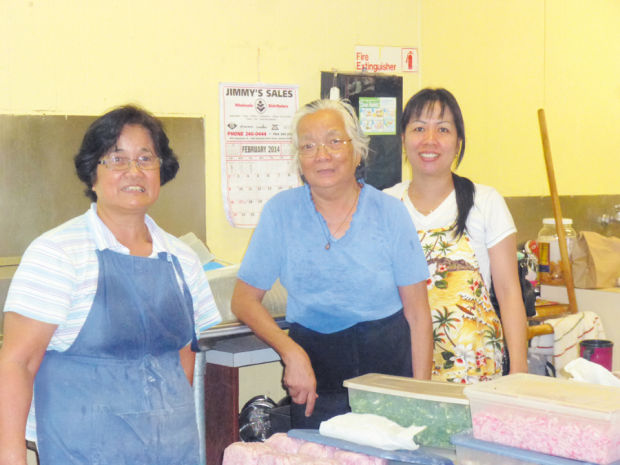So often, it seems the most praiseworthy are also the humblest. That’s certainly the case with Hamura’s Saimin Stand, a modest but iconic restaurant tucked on a back street off Lihue’s Rice Street, where four generations have ladled up countless
So often, it seems the most praiseworthy are also the humblest.
That’s certainly the case with Hamura’s Saimin Stand, a modest but iconic restaurant tucked on a back street off Lihue’s Rice Street, where four generations have ladled up countless bowls of deliciousness.
Hamura’s food is all “back-in-the-day kine, old style!” explained owner Lori Tanigawa, through a cloud of rising steam as she dropped handmade wontons into boiling water one recent morning before lunch rush began. “Old school!”
That’s good enough for the hungry hordes — loyal residents who have been eating at Hamura’s all their lives, joined by curious visitors drawn by guidebooks and online reviews — who crowd the small eatery every day of the week.
They line up along the walls or stand outside to wait for a wooden stool at the serpentine counter that curves through the crowded space.
And it’s good enough for an extremely prestigious national award. Hamura’s was honored as one of “America’s Classics” in 2006 by the James Beard Foundation. The professional nonprofit, which promotes the culinary arts, lauded Hamura’s Saimin for excellence and “preserving America’s culinary heritage and diversity.” It’s the equivalent of an Oscar in the food world — not that you’ll see it displayed anywhere on the warm yellow walls of Hamura’s.
The foundation even offered two round-trip tickets to the award gala in New York, but none of the family members could accept. Why not? “We’re busy! Very busy,” Tanigawa said indignantly, gesturing at the bustling kitchen behind her, where pots bubbled, meat sizzled and tubs of fresh ingredients lined every available surface.
She shrugged at the national accolade: sure, it was nice. “We got some recognition from other places,” plus some pots and pans from restaurant suppliers. But at Hamura’s, there’s work to be done, people to feed.
“I’m not about those things,” Tanigawa said. “My motto is: ‘Quality vs. quantity.’”
The quality speaks for itself: rich broth, chewy noodles, savory wontons. The flavors practically spill out of the wide bowls, piled high with noodles and meat, and the steamy air is so fragrant you can almost taste it.
Quality, definitely. But the quantity is impressive, too.
“We make a lot of saimin a day,” Tanigawa said. “I’d say 800 pounds a day.”
All the noodles are made fresh daily, while the wontons are made up twice a week in 140-pound batches.
Hamura’s offers various sized bowls of noodles — saimin, regular or special; wonton mein or soup; and fried noodles on weekdays, until they sell out — and island favorites, such as fried wontons, shrimp tempura and BBQ meat sticks. Prices are modest, ranging from $2 for a manapua to $8.50 for the largest bowl of special saimin.
The menu is “pretty basically the same” as the one developed by her grandparents, Aiko and Charlie Hamura, who started selling homemade saimin from their car in 1951, Tanigawa said. “We’ve only added a few things,” she said, namely the special, the shrimp saimin and the udon noodles.
No trip to Hamura’s is complete without a slice of lilikoi chiffon pie. The sweet and airy pie made with passion fruit juice is a work of edible art, standing high on a flaky crust and topped with whipped cream. The pie is $3.25 a slice, but if you’re lucky, they may have enough that day to sell you a whole pie for $16.50.
The lilikoi pie enterprise is handled by Tanigawa’s nephews — Nick, Todd and Justin Barcial — and her sister, Wendy Barcial. The Barcials make all the pies, manapua and shave ice, which is served up at a small counter near one of the doors.
Members of the next generation are hard at work, keeping Aiko’s legacy going. “It’s our turn,” Tanigawa said of herself and her sister, the last of the Hamura grandchildren, and “eventually my kids and nephews” will take over.
Tanigawa has worked at the little restaurant “most of my life,” starting when she was about 9 and puttered around, helping her parents, Bob and Hazel Hiraoka. She has been “fully running it” for the past 10 years, “the whole barrel of fun.”
“I’m still here! I’m like a relic!” she said with a laugh.
The long-running success of a place like Hamura’s isn’t easy. You have to do more than cook food and serve it, Tanigawa explained. You have to create an environment; otherwise, people will say, ‘Why go there? It’s a dump!’
“In one restaurant, everything gotta work hand in hand, or it’s not gonna work,” Tanigawa explained. “You gotta have everything fit in. Like a puzzle. It all has to fit.”
Hamura’s Saimin is at 2956 Kress St., Lihue, and can be reached at 245-3271. It is open from 10 a.m. daily until 10:30 p.m. on weekdays and 12 a.m. on weekends. All sales are cash only.




